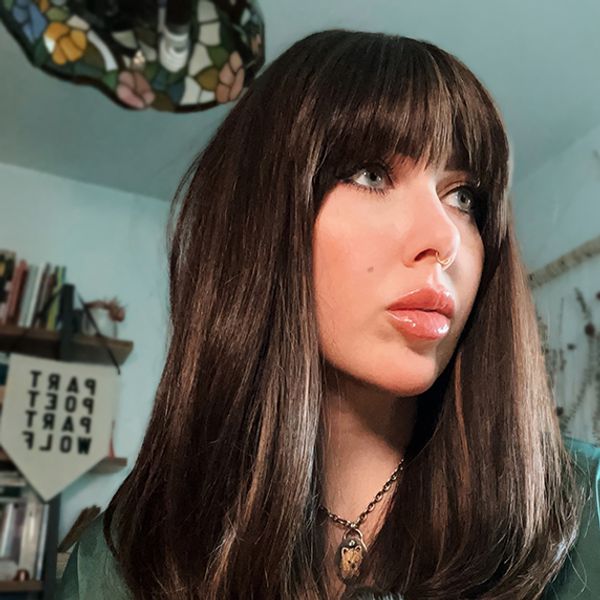Lia Purpura, Decaying Wood (detail), featured in AGNI 102
In Arabic, the difference between the words poetry—shi3r—and hair—sha3r—is so slight you’d be forgiven for conflating them. My body did: when my hair fell out, poems sprang up.
It was February 2022. I had just accepted a new job, my mother’s health was precarious, and I was still mourning my three beloved dogs, who had all died within the last year.
The body can only take so much.
~
Autoimmune-related alopecia is unpredictable. I had lived for years without hair on my arms or legs (except, inexplicably, the knees), but the hair on my head remained. A rogue bald patch here or there didn’t last for long. But last year, something in the machinery of my body unlatched.
I remember when I realized something was wrong: at work, at my desk, on another Zoom call. I was wearing a light blue sweater. I brushed my hair off my shoulder, and there was a tuft draped across my chest, ends so neat it looked as though it had been cut.
Not long after, my hair began pooling on every surface. It nestled in corners. Joined the medley of dog fur. I parted my hair to hide the thinning, piecing over the smooth spots. But eventually the cascades of dark locks that had hung to my hips winnowed. More clumps fell out. More scalp shone through.
Autoimmune disease can reconfigure the body’s borders without notice. Because my hair’s immune privilege was revoked, my white blood cells treated parts of my own body as trespassers.
~
I will spare you the details of my unraveling. I felt the things you’d expect a cis woman in her thirties to feel: stripped of my gender, my desirability. I noticed more conflations: hair as shorthand for woman. Hair as shorthand for beauty and virtue. Hair as identifier and identity.
In that nebulous state where who I had been was no longer congruent with who I saw in my reflection, metaphor was everywhere. In trees shedding their leaves. In the hens molting in my backyard. In the wigs I wore, the people I could be.
~
Loss and creation are intrinsically connected, perhaps in part because loss rewires the way we experience the world. Grief instigates the human need to make sense—which often requires expression, imagination, and reconstruction.
The more I learned about what hair means—to an individual, to a culture—the more I understood what I had lost. That not only gave me permission to grieve but also to write.
~
On June 5, 2022, I shaved off what was left of my hair. I did not feel empowered; I dreamt of my hair returning. In the shower, phantom tendrils rained down my shoulders.
I lived those next six months like I was haunting myself. I left the house less and less. I avoided mirrors and old photographs. I could not climb out of the feeling and back into my body.
I needed a tether, a way to pin myself to myself. And so, I started writing.
In the mirror I saw a woman I did not recognize; on the page, I heard the voice that belonged to her. I listened and wrote; I was part documentarian, part conduit.
More than a year later, my hair shows no sign of returning, but I accrued something else: a third poetry manuscript written in three months; a reflection that feels like mine again.
In that feral season of dreaming, sweating, I clawed poems into existence. I clawed the idea of myself back into existence.

Ruth Awad
Ruth Awad, a Lebanese-American poet, is the author of Set to Music a Wildfire (Southern Indiana Review Press, 2017), winner of the Michael Waters Poetry Prize and the Ohioana Book Award for Poetry. Her work has appeared in Poetry, Poem-a-Day, AGNI, The Believer, The New Republic, Kenyon Review, and elsewhere. The coeditor, with Rachel Mennies, of The Familiar Wild: On Dogs & Poetry (Sundress Publications, 2020), she has twice received the Ohio Arts Council Individual Excellence Award and is a 2021 National Endowment for the Arts fellow in poetry. (updated 10/2023)
